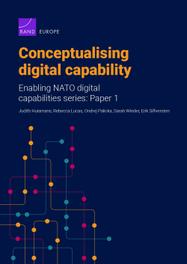Conceptualising Digital Capability
Enabling NATO Digital Capabilities Series: Paper 1
ResearchPublished Apr 24, 2025
This paper, the first in a three-part series, explores digital capabilities in NATO, defining their role in NATO’s core tasks and support to digital transformation. It identifies a lack of shared definitions and stresses the need for collaboration among NATO and industry partners. This research aims to enhance discussions about NATO's resilience and interoperability, informing debate ahead of the June 2025 summit in The Hague.
Enabling NATO Digital Capabilities Series: Paper 1
ResearchPublished Apr 24, 2025

This is the first in a series of three papers exploring the evolving role of digital capabilities in the North Atlantic Treaty Organization (NATO). This paper seeks to develop a clearer conceptual understanding of digital capability, its relationship to digital transformation, and how digital capabilities are supporting the core tasks of the Alliance. The paper also explored the role of digital capabilities in the context of NATO’s core tasks: deterrence and defence; crisis prevention and management; and cooperative security. Our analysis reveals a lack of universally accepted definitions of ‘digital’, ‘digital capability’ and ‘digital transformation’, particularly within defence. Our main recommendation is therefore to foster shared understanding of these terms, which is vital for effective cooperation across NATO and with industry and the science and technology community, particularly with partners new to working in defence.
The papers were sponsored by Microsoft as part of a broader package of work to explore how NATO and its members can progress the development of digital capabilities, how the development of such capabilities can be more effectively enabled, and how these capabilities can enhance NATO’s resilience and interoperability. The full series of papers is intended to drive preparatory discussions on the importance and future of NATO’s digital capabilities ahead of the June 2025 summit in The Hague.
The paper draws on case studies of how Sweden, Estonia, Finland, and Poland conceptualise digital capabilities within their domestic contexts. These case studies will shortly be made available as individual documents, including in their respective languages.
This work was sponsored by Microsoft and conducted by the Defence, Security, and Justice Program within RAND Europe.
This publication is part of the RAND research report series. Research reports present research findings and objective analysis that address the challenges facing the public and private sectors. All RAND research reports undergo rigorous peer review to ensure high standards for research quality and objectivity.
This document and trademark(s) contained herein are protected by law. This representation of RAND intellectual property is provided for noncommercial use only. Unauthorized posting of this publication online is prohibited; linking directly to this product page is encouraged. Permission is required from RAND to reproduce, or reuse in another form, any of its research documents for commercial purposes. For information on reprint and reuse permissions, please visit www.rand.org/pubs/permissions.
RAND is a nonprofit institution that helps improve policy and decisionmaking through research and analysis. RAND's publications do not necessarily reflect the opinions of its research clients and sponsors.